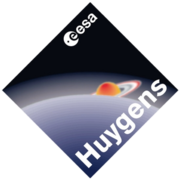Huygens probe

An actual-size replica of the probe, 1.3 metres across
|
|
| Mission type | Lander |
|---|---|
| Operator | ESA/ASI/NASA |
| COSPAR ID | 1997-061C |
| Website | Huygens home page |
| Spacecraft properties | |
| Manufacturer | Aérospatiale |
| BOL mass | 319 kg (703 lb) |
| Start of mission | |
| Launch date | December 25, 2004 |
| Rocket | Titan IV(401)B piggybacking with Cassini orbiter |
| End of mission | |
| Last contact | 13:37, January 14, 2005 |
| Titan lander | |
| Landing date | 12:43 UTC SCET, January 14, 2005 |
| Landing site | 10°12′S 192°24′W / 10.2°S 192.4°W |
|
|
|

ESA quadrilateral mission insignia for the Huygens mission.
Huygens was an atmospheric entry probe that landed successfully on Saturn's moon Titan in 2005. Built and operated by the European Space Agency (ESA), it was part of the Cassini–Huygens mission and became the first spacecraft ever to land on Titan and the furthest landing from Earth a spacecraft has ever made. The probe was named after the Dutch 17th-century astronomer Christiaan Huygens, who discovered Titan in 1655.
The combined Cassini–Huygens spacecraft was launched from Earth on October 15, 1997.Huygens separated from the Cassini orbiter on December 25, 2004, and landed on Titan on January 14, 2005 near the Xanadu region. This was the first and, so far, only landing ever accomplished in the outer Solar System. It touched down on land, although the possibility that it would touch down in an ocean was also taken into account in its design. The probe was designed to gather data for a few hours in the atmosphere, and possibly a short time at the surface. It continued to send data for about 90 minutes after touchdown. It remains the most distant landing of any human-made craft.
Huygens was designed to enter and brake in Titan's atmosphere and parachute a fully instrumented robotic laboratory to the surface. When the mission was planned, it was not yet certain whether the landing site would be a mountain range, a flat plain, an ocean, or something else, and it was hoped that analysis of data from Cassini would help to answer these questions.
...
Wikipedia
